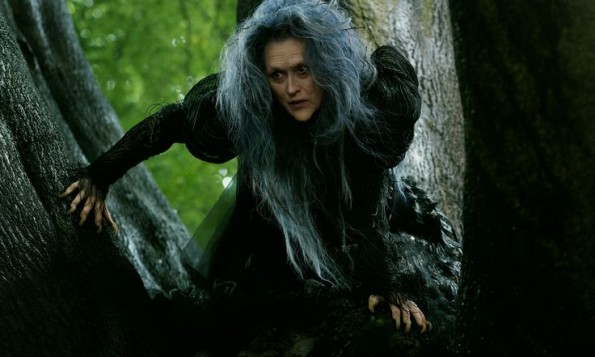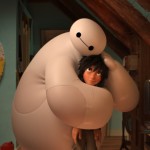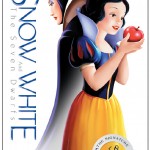Before I begin this review, I need to state that I own the original Broadway cast recording of Into the Woods, the DVD of PBS’ 1991 recording of the stage show, the libretto, and the complete vocal score which I occasionally play through in my spare time. I should also note that I believe Into the Woods very rightly beat The Phantom of the Opera at the 1987 Tony Awards to win best original score and best book of a musical. (That is not meant as a slight to Phantom, which is a great musical.) All that is to say, I am predisposed to love any decent production of this musical.
When I first heard that Rob Marshall was helming an adaptation of Into the Woods for Disney, I was nervous and skeptical. While I still think Marshall’s adaptation of Chicago is brilliant, I have very few kind words for his other films. Given Disney’s track record with fairytales and musicals, I also worried the darker themes integral to Into the Woods would be whitewashed. Early casting rumors and news reports confirmed my initial doubts, but then composer and lyricist Stephen Sondheim, who is exceedingly critical of adaptations of his own work, praised the film highly. When I saw the promotional videos, it was clear the film would be more or less faithful to the play, and it looked like it would be a decent film as well.
Within the first few minutes, I was completely sold. Watching the fifteen minute prologue unfold was the greatest moment of magic I have seen in any film this year. The prologue introduces Cinderella (Anna Kendrick), Jack of the beanstalk (Daniel Huttlestone), and Little Red Riding Hood (Lila Crawford) and interweaves those fairytales within a single world. Tying all these stories together is a Baker (James Corden) and his Wife (Emily Blunt) who have been cursed by a Witch (Meryl Streep). To have the curse reversed they will need to retrieve four items before the blue moon at midnight in three days: the cow as white as milk, the cape as red as blood, the hair as yellow as corn, and the slipper as pure as gold.
All the characters journey into the woods to get their wish, and that journey is both literal and figurative. Along the way they stray from the path, and as with all foolish decisions, there are unforeseen consequences that come after their wishes have been fulfilled. Into the Woods explores those consequences in its darker final forty minutes, which comes after the traditional endings to the fairy tales.
The last forty minutes of the film are a truncated version of act two of the stage show. The brilliant second half of act two is preserved almost unchanged in the film, but the lead up to that part is significantly shortened. I think that change strengthens the story, because as much as I love the musical, the first half of act two slightly bogs down the story line with a little too much setup for the ending. The film risks having not enough setup, but all the essential scenes are included.
I have always been surprised when people tell me they wish Into the Woods ended with the traditional endings of the interwoven fairy tales and omitted the darker second half. I think that would be a terrible mistake which would undermine the entire musical. Fairy tales are stories that were designed to teach some moral lesson to children, and Into the Woods is deeply concerned with morality and consequences. The seeds are planted through the first half as all the characters selfishly pursue their wishes for temporal happiness, forgetting that their actions affect everyone. The darker elements after “happily ever after” are when the characters must deal with the consequences of their actions. As the Witch sings:
“Told a little lie,
Stole a little gold,
Broke a little vow,
Did you?
Had to get your prince,
Had to get your cow,
Have to get your wish,
Doesn’t matter how—
Anyway, it doesn’t matter now.”
The moral of this conglomeration of fairy tales is twofold: no one is alone, even in the midst of our worst mistakes; and our actions have consequences. It is fitting that the next two songs are titled “No One is Alone” and “Children Will Listen,” even if one song is cut to strengthen that connection.
In bringing the musical to the screen, James Lapine adapts his own libretto, trimming it down slightly, but preserving what made it magical in the first place. The biggest change he makes is cutting the narrator, which works, because his lines are either shown via flashbacks or the Baker speaks them as a voice-over. I thought there could have been a few less voice-overs; however, they did set up the last scene perfectly.
Marshall’s direction is not particularly imaginative, but it is non-distracting. He does not overedit the film, jumping too quickly from character to character, which is a danger with this many story lines. I appreciated that if two characters were singing in different locations, he was content to only show one of them and not rapidly jump between them. To his credit, Marshall maintains the film’s momentum, and he keeps the transitions from dialogue to song seamless.
The entire cast gives very good performances, although some actors do outshine others. Meryl Streep is fantastic as the Witch; she is less comedic than Bernadette Peters was on Broadway, but she is also more menacing, and Streep’s rendition of the show stopping “The Last Midnight” is probably the finest I have ever heard. Anna Kendrick is great as Cinderella, and she nails the tongue-twisting lines of her big solo, “On the Steps of the Palace.” Johnny Depp is creepy and funny in his extended cameo as the Wolf, and while more implicit than the play, the sexual overtones of “Hello Little Girl” and the Wolf’s seduction of Little Red Riding Hood are not lost. The musical theater backgrounds of Daniel Huttlestone and Lila Crawford are apparent, and they are more than up to the challenge of playing the precocious Jack and Little Red Riding Hood. As the egotistical Prince Charming, Chris Pine has an absolute blast and is a joy to watch. Emily Blunt shines as the Baker’s Wife, capturing her character’s initial kindness and increasingly cold hearted determination to lift the Witch’s spell at whatever cost. James Corden is very good as the Baker; he may be the least remarkable of the cast, but he does have an appropriate everyman quality.
I anticipate Marshall’s directing may be a turnoff for critics and the darker twists may be a turnoff casual viewers, but I found this production of Into the Woods to retain the original’s beauty, and the full orchestra makes Sondheim’s score sound absolutely gorgeous.
Was Into the Woods (*****) the best movie I saw this year? No. Did it move me more than any other film, and did I enjoy it more than any other new release I’ve seen in the past year or two? I don’t care how much of my cinephile credential I lose. The answer is most emphatically yes.
—
Evan Cogswell blogs about film at Catholic Cinephile.













